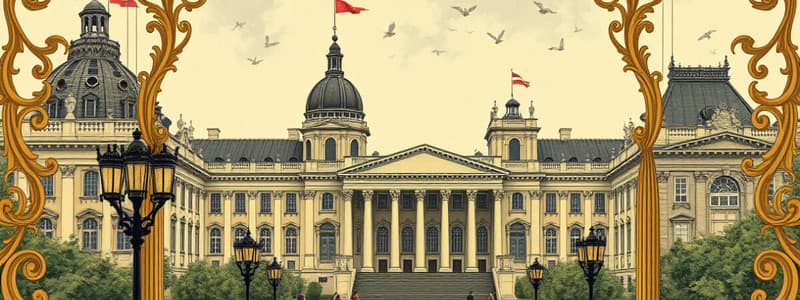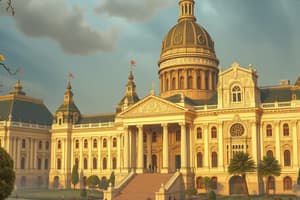Podcast
Questions and Answers
What is a monarchy?
What is a monarchy?
- A system where people elect officials
- One person from a royal family is ruler (correct)
- Absolute power of one leader
- Governed by a group of wise individuals
Which of the following describes a dictatorship?
Which of the following describes a dictatorship?
- Power shared among many
- Governed by an elite group
- People vote for their representatives
- Absolute power of one leader (correct)
What does oligarchy mean?
What does oligarchy mean?
- Monarchy rule
- Totalitarian control
- Rule by democracy
- Governed by a smart upper class group (correct)
What is representative democracy?
What is representative democracy?
What is another name for the central government?
What is another name for the central government?
What is the role of the legislative branch?
What is the role of the legislative branch?
What does the executive branch do?
What does the executive branch do?
What is the function of the judicial branch?
What is the function of the judicial branch?
What are checks and balances?
What are checks and balances?
What does veto mean?
What does veto mean?
What are the two main political parties in the US?
What are the two main political parties in the US?
Define immigrants.
Define immigrants.
What are the three basic economic systems?
What are the three basic economic systems?
What is a recession?
What is a recession?
What is a depression?
What is a depression?
Define inflation.
Define inflation.
What does deflation mean?
What does deflation mean?
What is communism?
What is communism?
What is capitalism?
What is capitalism?
What is the Federal Reserve System?
What is the Federal Reserve System?
What does Gross Domestic Product (GDP) measure?
What does Gross Domestic Product (GDP) measure?
What is Gross National Product (GNP)?
What is Gross National Product (GNP)?
What is the Consumer Price Index (CPI)?
What is the Consumer Price Index (CPI)?
What are topographical maps?
What are topographical maps?
Define elevation.
Define elevation.
What is the equator?
What is the equator?
Describe the Prime Meridian.
Describe the Prime Meridian.
What is latitude?
What is latitude?
Define longitude.
Define longitude.
What describes a tropical climate?
What describes a tropical climate?
What characterizes a temperate climate?
What characterizes a temperate climate?
What is an arctic climate?
What is an arctic climate?
What does demography study?
What does demography study?
Define rural areas.
Define rural areas.
What are urban areas?
What are urban areas?
What is a census?
What is a census?
Flashcards are hidden until you start studying
Study Notes
Types of Government
- Monarchy: A system where one individual from a royal family is the ruler.
- Dictatorship: Governance characterized by the absolute power of a single leader.
- Oligarchy: A form of government run by a small, elite class that is typically educated and privileged.
- Representative Democracy: A political system where citizens elect officials to represent their views and make decisions on their behalf.
Government Structure
- Central Government: Also termed as Federal Government, it refers to the primary governing body in a federal state.
- Legislative Branch: The segment of the federal government responsible for making laws.
- Executive Branch: This branch carries out and enforces laws enacted by the legislative branch.
- Judicial Branch: Interprets laws and ensures they are applied fairly.
- Checks and Balances: A system designed to prevent any one branch of government from acquiring too much power.
Political Parties and Immigration
- Major Political Parties: The United States primarily recognizes two main political parties: Republicans and Democrats.
- Immigrants: Individuals who relocate to a different country for various reasons, including economic opportunities and safety.
Economic Systems and Indicators
- Basic Economic Systems: Three main systems include Capitalism, Socialism, and Communism, each differing in government involvement.
- Recession: A period marked by reduced productivity and income levels.
- Depression: A more severe and prolonged economic downturn than a recession.
- Inflation: The increase in the overall price level of goods and services in an economy.
- Deflation: A decrease in the general price level of goods and services.
- Communism: An economic framework with significant government control over production and distribution.
- Capitalism: An economic model characterized by minimal government interference in the economy.
Economic Measurements
- Federal Reserve System: Manages the U.S. economy by influencing monetary policy and maintaining balance.
- Gross Domestic Product (GDP): Represents the total value of all goods and services produced, indicating economic growth.
- Gross National Product (GNP): Measures GDP plus income generated from foreign investments.
- Consumer Price Index (CPI): Gauges changes in the cost of living over time.
Geographic and Climatic Concepts
- Topographical Maps: Provide detailed representations of landforms and terrain features.
- Elevation: Refers to the height of a geographical location above a reference point, typically sea level.
- Equator: The horizontal line that divides the Earth into the Northern and Southern Hemispheres.
- Prime Meridian: The vertical line that splits the Earth into Eastern and Western Hemispheres.
- Latitude: Represents the horizontal lines on the globe, indicating north-south position.
- Longitude: Vertical lines on the globe that designate east-west position.
Climate Types
- Tropical Climate: Characterized by hot, humid conditions with minimal seasonal variation.
- Temperate Climate: Defined by the presence of four distinct seasons throughout the year.
- Arctic Climate: Noted for its prolonged cold winters and brief cool summers.
Population Studies
- Demography: The statistical study of populations, focusing on birth, death, migration, and other changes.
- Rural Areas: Regions that are less developed, typically with significant agricultural land.
- Urban Areas: Densely populated regions featuring buildings, factories, and advanced infrastructure.
- Census: A systematic process for collecting and recording demographic information about a population.
Studying That Suits You
Use AI to generate personalized quizzes and flashcards to suit your learning preferences.




